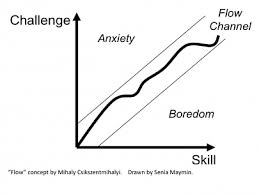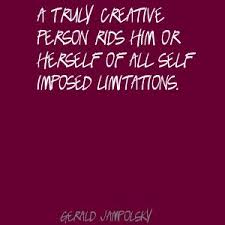 The concept of “flow” is a useful tool to describe how moving toward opportunities of dissonance (discomfort) as well as being among others whom we can trust to hold our tensions as we practice holding them ourselves, is necessary for developing a more complex self. The “absent” friend solidly reminded me of our necessary journey toward differentiation and self-understanding and sufficiency– complexity. Examining the flow experience, it is not surprising why we crave it. Described as optimal experience, it’s a suspension of space and time and captures the most cohesive of moments when our “I”s disappear, self-consciousness and critique vanishes, and the activity is purely engaged in for the experience itself. Yet, in order to achieve it, we have to move out of the hiding, numbing, oblivious, undifferentiated cocoons that we live in.
The concept of “flow” is a useful tool to describe how moving toward opportunities of dissonance (discomfort) as well as being among others whom we can trust to hold our tensions as we practice holding them ourselves, is necessary for developing a more complex self. The “absent” friend solidly reminded me of our necessary journey toward differentiation and self-understanding and sufficiency– complexity. Examining the flow experience, it is not surprising why we crave it. Described as optimal experience, it’s a suspension of space and time and captures the most cohesive of moments when our “I”s disappear, self-consciousness and critique vanishes, and the activity is purely engaged in for the experience itself. Yet, in order to achieve it, we have to move out of the hiding, numbing, oblivious, undifferentiated cocoons that we live in.
This weekend as I sat in the movie theater preparing for the cinematic adventure of Iron Man 3, my 3D glasses perched on the bridge of my nose, I leaned over to the friend on my left to say, “I feel like I need to put on my seat belt.” The objects in the trailers were sneaking up on me, flying past me, exploding before me, and I felt like I needed to prepare myself in some way…buckle in and put on my armor? Achieving flow demands a removal of our armor, a movement away from the belief that we have to protect ourselves or prepare for battle, or approach life like a mine field. (If you haven’t seen the movie yet, and you want to, don’t read this next sentence…) At the end of the movie, Robert Downey Jr. chose to remove the shrapnel from his chest, blow up every armored suit he had created, and live a more vulnerable, less fearful, more heart-centered life with his partner, and he stated, “We create our own demons.”
Epictetus agrees with him, “Men are not afraid of things, but of how they view them.”
And Marcus Aurelius, the great emperor, similarly wrote: “If you are pained by external things, it is not they that disturb you, but your own judgment of them. And it is in your power to wipe out that judgment now.”
I believe in all of these statements.
 Aristotle stated long ago that more than anything else, we move toward what will make us happy. Perhaps we perceive that as comfort, as rightness, as the hope of something great in the future. Any way you look at it, however, the impetus toward the pursuit of happiness is not firmly seated in the present moment. Protection and numbing of vulnerability is for fear of what might happen. Further, avoidance of conflict and striving only for who and what agrees with us or meets our expectations is created by way of what we have experienced in the past and distorting how others might perceive us in the future. Flow, however, depends on this moment, right now. Flow is conditionally attached to a non-worrying, unselfconscious, effortless energy when information filtering into our awareness is congruent with our goals. If we do pause to assess our performance, the internal feedback is positive, and our sense of self is strengthened. Through these experiences our grit, our determination, our resilience, our behavioral persistence, and the balance between differentiation and integration are fortified.
Aristotle stated long ago that more than anything else, we move toward what will make us happy. Perhaps we perceive that as comfort, as rightness, as the hope of something great in the future. Any way you look at it, however, the impetus toward the pursuit of happiness is not firmly seated in the present moment. Protection and numbing of vulnerability is for fear of what might happen. Further, avoidance of conflict and striving only for who and what agrees with us or meets our expectations is created by way of what we have experienced in the past and distorting how others might perceive us in the future. Flow, however, depends on this moment, right now. Flow is conditionally attached to a non-worrying, unselfconscious, effortless energy when information filtering into our awareness is congruent with our goals. If we do pause to assess our performance, the internal feedback is positive, and our sense of self is strengthened. Through these experiences our grit, our determination, our resilience, our behavioral persistence, and the balance between differentiation and integration are fortified.
On the other hand, without awareness, if we live on automatic pilot, should we decide that it’s just too hard to go through whatever effort is required to meet the demands of our goals or learn the skills necessary to become more proficient, or if we base our behavior on what everyone else thinks we should be or believe, we miss the possibilities of flow. Like the question I posed at the beginning, “how does this relate to what I already know?”, Csikszentmihalyi, author of Flow– The Psychology of Optimal Experience, explains how the information we encounter is filtered according to its importance to the self. We can perceive it as threatening, supportive, or neutral to our goals, and with this assessment our behavior follows suit.
Do you know individuals who persist in the face of adversity? Just this morning I saw another woman on the news being put through her paces in the physical therapy department of her local hospital after losing her leg during the Boston bombings. “This is the hand I’ve been dealt,” she said with a smile. Comfortable? Not even close. Painful, arduous, and demanding. And yet she uses that energy to move closer to what is meaningful to her. Is it “right” that she lost a limb in the attack? Is that question even worth asking? It makes sense that we would. Our bent toward rightness and avoidance of conflict started almost immediately. We were rewarded at home for following rules. We were punished for doing something “wrong.” In school we receive grades for completing assignments the “right” way or giving the “right” answers. Surprisingly enough, my dissertation work is even graded. How can you grade a student on the level of understanding and synthesis regarding theory and conceptualization of a study? It’s not black and white, and yet because we need certainty, grades persist. Even in our places of work we are rewarded for following protocol, for staying true to procedure. Of course, value exists in many regards when it concerns safety, however, when it is expected that individuals not think for themselves or develop a sense of autonomy and competence in regards to their unique skills and assets, creativity and innovation is thwarted.
Keith Sawyer, Washington University creativity researcher, has shown that individuals who work alone are more efficient at creating innovative ideas versus those who work in groups. Understanding our desire for acceptance and relatedness, this makes sense. However, in a group environment, where individuals are actively encouraged to throw out any idea, no matter how ignorant, mundane, corny, irrelevant, or insane, and when quantity is the goal, creativity spikes! If every individual has had a different experience in life, and they have interpreted it in a different way, and they are asking themselves, “how does this bite of information relate to what I already know?”, can you see how the possibilities expound? This wouldn’t happen if we were focused on avoiding vulnerability, worried about making mistakes, or taking risks!
What a great post. Everything from flow to Ironman 3. First of all, I agree that it is astonishing that flow is so difficult for many people to achieve and then even after you do, you can’t stay there. It is the thought of the self I think that make flow difficult to maintain. Eventually most people start wondering how they are doing and that is the end of that. I also wanted to agree with your assessment of assessments. Grading is often times subjective and pointless, seemingly designed to create a society that performs to expectations rather than exceeds in creativity. Thank you for the thought enjoyed this thoroughly. 🙂
Jonathan, Thanks! I agree with you. We’re conditioned and neurologically inclined (through use of our prefrontal cortex) to “reorient” ourselves through a focus on the “self.” Except we are also inclined to move away from a very present-focused, non-judgmental approach. If it feels “strange” we tend to associate that as “wrong.” If it’s foreign, it’s uncomfortable. And then what happens? If it’s uncomfortable, we want to be away from it rather than explore it. Love your thoughts- thank you for sharing!
You are welcome. I am trying hard to not move away from the foreign and explore. That is a great thought for a post sometime, thank you very much for the article. Made me think and I love that! 🙂
Just pretend like you’re taking a trip to a country you’ve never been before. Exciting! 😉